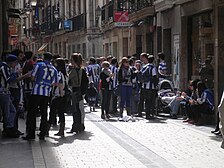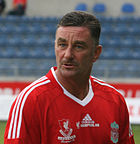Shipping from Europe with tracking number /
Real Sociedad
 | |||
| Full name | Real Sociedad de Fútbol, S.A.D. | ||
|---|---|---|---|
| Nickname(s) | Txuri-Urdinak (The White and Blues) La Real (The Royal) | ||
| Founded | 7 September 1909 | ||
| Ground | Anoeta Stadium | ||
| Capacity | 39,500[1] | ||
| President | Jokin Aperribay | ||
| Head coach | Imanol Alguacil | ||
| League | La Liga | ||
| 2021–22 | La Liga, 6th of 20 | ||
| Website | Club website | ||
Real Sociedad de Fútbol, S.A.D., more commonly referred to as Real Sociedad (pronounced [reˈal soθjeˈðað]; Royal Society), Erreala or Reala in Basque, La Real in Spanish, is a Basque professional sports club in the city of Donostia-San Sebastián, Basque Country, founded on 7 September 1909. It plays its home matches at the Anoeta Stadium.
Real Sociedad won the Liga title in 1980–81 and 1981–82, and finished runner-up in 1979–80, 1987–88, and 2002–03. The club has also won the Copa del Rey three times, in 1909, 1987 and 2020. It contests the Basque derby against rivals Athletic Bilbao. Real Sociedad was a founding member of La Liga in 1929; its longest spell in the top flight was for 40 seasons, from 1967 to 2007.[2]
Traditionally the club followed a policy (similar to that of its rival Athletic) of signing only Basque players, before signing Republic of Ireland forward John Aldridge in 1989. While a strong Basque contingent has been retained among its players, nowadays both non-Basque Spaniards and foreign players are represented at the club. Its youth section subsequent to the all-Basque era has still been very successful in developing internationally renowned players, such as World Cup winners Xabi Alonso and Antoine Griezmann.[3]
The club has competed in the UEFA Champions League four times. In the 2013–14 season, the team finished 4th place in the group stage. In the 2003–04 season, the club progressed to the round of 16 before losing to Lyon. In the 1982–83 European Cup, its predecessor tournament, the team reached the semifinals, only to lose narrowly against Hamburger SV. In the 1981–82, the club lost in the first round against CSKA Sofia.
Aside from football (including a women's team), Real Sociedad also has several sections in athletics, including track and field, field hockey and basque pelota.
History
Early history
Football was introduced to San Sebastián in the early 1900s by students and workers returning from Britain. In 1904, they formed San Sebastián Recreation Club, the first football club in the city, and in 1905 the club competed in the Copa del Rey.[4] In 1907, a conflict between the club's members caused the team to split with several players (such as Alfonso and Miguel Sena and Domingo Arrillaga) leaving to create a new team in 1908, the San Sebastian Football Club. This team applied to enter the 1909 Copa del Rey, but complications over registration permits saw them compete as Club Ciclista de San Sebastián.[4] This team convincingly defeated the powerful Athletic Club 4–2 in the quarter-finals and then beat Club Español de Madrid 3–1 in the final.[5] A notable figure of this team was George McGuinness, who netted 6 goals in the tournament including the opener in the final.
A few months after this victory, the players who had won the tournament founded the Sociedad de Futbol on 7 September 1909. Sociedad applied to enter the 1910 Copa del Rey, but once again had to compete under a different name, Vasconia de San Sebastián, and once again they reached the final (UECF), where they were beaten by Athletic (0–1).[6] In the same year, King Alfonso XIII – who used San Sebastián as his summer capital – gave the club his patronage, where it subsequently became known as Real Sociedad de Fútbol. The first final the club played as Real Sociedad was in 1913, where FC Barcelona needed three games to beat them.[7] After a 15-year hiatus, Sociedad reached the 1928 final, which was remarkably similar to their previous one since Barcelona again needed three games to beat them at El Sardinero.[8]
Real Sociedad was a founding member of La Liga in 1929. The team came fourth with Francisco "Paco" Bienzobas finishing as the top scorer. The team's name was changed to Donostia Club de Futbol in 1931 with the advent of the Second Spanish Republic, but changed back to Real Sociedad after the Spanish Civil War in 1939. The team has generally fluctuated between the Primera and Segunda divisions, in one period (during the 1940s) managing to be relegated and promoted seven times. Around that time, the sculptor Eduardo Chillida was the team's goalkeeper until injury put a stop to his football career.
The success of the 1980s
The team finished as runners-up in La Liga for the first time in 1979–80, gaining 52 points compared to Real Madrid's 53, and 13 points clear of third-placed Sporting de Gijón. Real Sociedad won its first ever Primera División title at the end of the 1980–81 season, denying Real Madrid a fourth-consecutive title because although both clubs earned 45 points and Madrid had the superior goal difference Sociedad were better in the head-to-heads.[9] This qualified La Real for the 1981–82 European Cup, where they were eliminated in the first round by CSKA Sofia of Bulgaria, who hosted and won the first leg 1–0. The second leg in Spain was a 0–0 draw.[10]
The club retained the Liga title the following season, beating Barcelona by 47 points to 45, under the management of Alberto Ormaetxea.[11] Forward Jesús María Satrústegui was the club's top scorer for 1980–81 with 16 goals.[12] He scored 13 the following season as Pedro Uralde was the top scorer, with 14.[13] The club reached the semi-finals of the 1982–83 European Cup, defeating Víkingur of Iceland, Celtic and Sporting Clube de Portugal before losing 3–2 on aggregate to eventual champions Hamburger SV.[14] Real Sociedad won the Supercopa de España at the beginning of the 1982–83 season, overturning a 1–0 defeat in the first leg to defeat Real Madrid 4–1 on aggregate.
On 11 March 1987, Real Sociedad set a record for most goals in a quarter-final of the Copa del Rey after defeating Mallorca 10–1. In the semi-finals of the same tournament, it beat its Basque rivals Athletic Bilbao 1–0 over two legs. On 27 June 1987, Real Sociedad won its first Copa del Rey title, defeating Atlético Madrid 4–2 on penalties after drawing 2–2. The match was held at La Romareda in Zaragoza, Aragon.[15] In the following season's Copa del Rey, Real Sociedad defeated Atlético Madrid again after defeating them in the quarter-finals. It then beat Real Madrid 5–0 on aggregate in the semi-finals, but lost 1–0 in the final to Barcelona at Real Madrid's Santiago Bernabéu Stadium on 30 March 1988.[16] In the 1987–88 La Liga, Real Sociedad were runners-up for the first time since its lost its title – with 51 points to Real Madrid's 62 – and three points clear of third-placed Atlético Madrid.[9]
For many years, Real Sociedad followed the practice of its Basque rivals Athletic Bilbao of signing only Basque players. It abandoned the policy in 1989 when it signed Irish international John Aldridge from Liverpool.[17] Aldridge scored 16 goals in his first season to be the club's top scorer,[18] and fourth-highest scorer of the entire league as La Real finished fifth.[19] In 1990, La Real signed an English striker, Dalian Atkinson of Sheffield Wednesday,[20] who therefore became the club's first black player.[21] He scored 12 goals in his first season, second at the club only to Aldridge's 17.[22] That was Aldridge's final season at La Real, and he left to play in the English 2nd tier at Tranmere Rovers, while Atkinson left to join top-flight Aston Villa.
In 1997–98, Real Sociedad finished third, its best finish since being runners-up for the first time since 1988. Its total of 63 points was 11 less than champions Barcelona but just two less than runners-up Athletic Bilbao. The club finished higher in the table than Real Madrid due to a superior goal differential.[19] Yugoslav striker Darko Kovačević scored 17 times that season, making him the fourth-highest scorer in the league.[23] The third-place finish qualified La Real for the 1998–99 UEFA Cup, where it beat Sparta Prague and Dynamo Moscow before being knocked out in the third round by Atlético Madrid.




